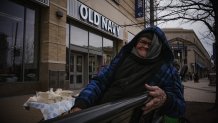Enrique Arias sold beanies, scarves and other clothing items on 14th Street NW in Columbia Heights. But over a matter of weeks, Arias lost his only source of income as the coronavirus outbreak in the Washington, D.C., area forced him to stop selling on the streets.
"I don't have any savings," he said. "I only have God's hand."
Arias now relies on gift cards and food donations provided by the public to the Vendedores Unidos Unemployment Mutual Aid Fund. Donations of the mutual aid are being collected by the non-profit Many Languages One Voice and then distributed to vendors.
Many Languages One Voice reported that it distributed $10,000 in the form of Visa gift cards in three weeks with the help of donations. According to the organization, at least 40% of vendor families receiving aid are undocumented— leaving many unable to receive government assistance like the coronavirus stimulus check.
Vendors themselves are going door to door distributing supplies, groceries and gift cards to their colleagues who have lost their only form of employment.
In the first two weeks since he stopped vending, Arias received two $50 gift cards and some non-perishable food he said would last him about a week. Arias said he did not know when to expect assistance.
"Only God knows," Arias said. "I only know that I won't end up living on the street."
Arias said he could earn up to $250 on a good day by vending.
I don't have any savings. I only have
Enrique Arias
God's hand.
On March 9, days before the global pandemic was declared, street vendors gathered to discuss how to move forward, said Megan Macaraeg, interim executive director at Many Languages One Voice. One week later, almost all street vendors stopped vending, she said.
"They were off the street even though they were sacrificing their income,” Macaraeg said.
Arias said he had no choice but to stop selling to protect himself from health risks.
"We try to take care of ourselves," he said. "We never know who might approach us."
Matea Salvador used to set up a table and sell perfume, jewelry and other products, next to Arias in Columbia Heights. Like dozens of street vendors, Salvador said street vending is the only way she can make a living. She said she fractured her pelvis in a previous job, so she can't work anywhere else.
Many Languages One Voice featured Salvador's story on their Facebook page as one of the many vendors who are now relying on donations to survive. The organization wrote about how Salvador supports people in the United States and in El Salvador.
"She has zero income and no access to unemployment as her work was almost entirely street vending," the post said.
Sixty-seven-year-old Jose Benitez has also received financial help from the mutual aid fund.
"I am very thankful because they are really trying to help," he said.
He used to sell cheese on the same street in Columbia Heights as Arias and Salvador. When he was still selling on the streets, Benitez said vending was an escape from staying home all day.
“This helps my mind, this makes me happy,” he said at the time. “I don’t earn a lot, but it’s money that I earn honestly.”
Benitez now only leaves his house to get dialysis treatment three times a week.

Street vending was a way for him to financially contribute to his family. Since he stopped, Benitez said that he won't be able to help with rent. Benitez said he was only able to help his sister buy groceries with the two $50 gift cards he received from the mutual aid fund.
Benitez went into isolation at the beginning of March, before most vendors, for health reasons. He said that at the time he was still making his usual sales.
But as D.C. shut down with orders to close non-essential businesses, Arias said fewer people walked by his stand.
"If we go out to sell right now it is not the same as when we would see multiple people pass by," he said. "Everything is paralyzed for now."

